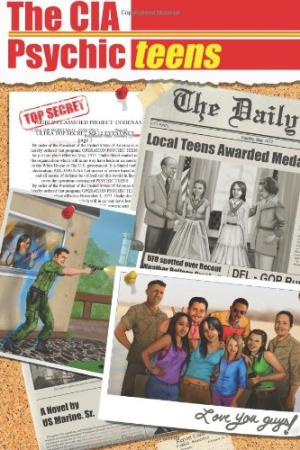The CIA Psychic Teens
Retro is in, with KGB assassins, Cold War spies, and teenage psychics.
Today’s teen fiction marketplace seems to recycle the same age-old archetypes of zombies, vampires, and ghosts over and over again. The CIA Psychic Teens dares to break the mold with psychic youths as heroes that try to save the United States from spies during the Cold War era.
When KGB officer Colonel Bogdanosky is dispatched by his superior, Andropov, to kill psychic aids to the American military, the Pentagon assigns Captain Scott and Gunny Thompsen to protect a team of young psychics, including twin teenagers Lexi and Aurora Borealis. The twins have been studied by the government and can communicate with each other through mind waves. They are employed to read the minds of those attending a presidential gala and single out potential assassins.
Structurally, The CIA Psychic Teens is sound. It features a quick narrative that gets to the point thanks to short paragraphs, fleeting dialogue passages, and lots of action, which drives the plot forward at an exciting pace. The book also avoids jargon from the 1970s setting. Lexi and Aurora speak and act like adults, rarely discussing teenage ideas of parties and boyfriends, and instead seem like committed youths seeking something better for their futures. This inevitably shows the author’s respect for his juvenile characters. Similarly, the love story subplot between Aurora and Captain Scott that arises while they masquerade as a real couple does not plummet into a typical teen romance. By removing any unnecessary sexual references from the subplot, the characters of The CIA Psychic Teens become professional, yet human, seeking meaning in their spiritual and love lives in a climate of suspense.
However, aside from the characters of President Gerald Ford and musician Stevie Wonder making cameo appearances in the narrative, The CIA Psychic Teens gives little feel for the period in which it takes place. The enemies of the narrative—the Communist Russians—never get fully developed and seem like archetypical baddies from old movies: humorless, ruthless, and without any depth. That, coupled with violent gun battles between Russian and American espionage teams—“[Captain Scott] emptied his magazine at the two closest agents“—juxtaposed with prayer sessions the heroes have thereafter—“Let’s all pray to God to protect the captain”—are disconcerting and somewhat difficult to reconcile in a teenage fiction work.
Overall, the book lacks humor and seems didactic in its presentation of Cold War politics and religious values. There is a real patriotic theme to the novel, which is admirable, but in the end, the heavy-handed or old-school ideas keep The CIA Psychic Teens from being totally believable, even as a young adult novel.
The CIA Psychic Teens, with strong action and pacing, is without question a page-turner.
Reviewed by
James Burt
Disclosure: This article is not an endorsement, but a review. The publisher of this book provided free copies of the book and paid a small fee to have their book reviewed by a professional reviewer. Foreword Reviews and Clarion Reviews make no guarantee that the publisher will receive a positive review. Foreword Magazine, Inc. is disclosing this in accordance with the Federal Trade Commission’s 16 CFR, Part 255.

